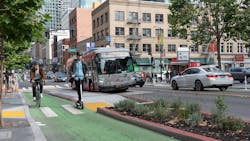SFMTA opens applications for FY 25 – FY 26 Powered Scooter Share Program
The San Francisco Municipal Transportation Agency (SFMTA) has opened applications for the Fiscal Year (FY) 2025 – FY 26 Powered Scooter Share Program. The program supports the city’s goal of providing multiple reliable transportation options to get around San Francisco, Calif.
The current permits for scooter share operators expire in June 2024. The next round will go into effect on July 1, 2024.
During the past several years, SFMTA has reached out to stakeholders in a variety of ways to gather feedback on the shared scooter program. The agency notes there have been concerns about sidewalk riding and improper scooter parking, including cases where scooters block the path of travel for people walking or using mobility devices, as well as the need for better adaptive scooter options.
The agency has taken the feedback from the community and revised its application process, making improvements in the following areas:
Scooter safety
SFMTA has launched campaigns and changed policies to protect people who walk, roll and take transit:
- Educational campaign: The agency’s campaign is aimed at people who ride shared scooters and/or privately-owned ones. The campaign includes information about how to ride safely.
- Safe parking incentive policy: The agency has instituted an incentive program that motivates scooter companies to move improperly parked scooters quickly. If scooter companies respond faster to complaints of improperly parked scooters, the fines they face are reduced. The average response time to complaints of improperly parked devices has dropped from six hours to one hour.
- Sidewalk detection technology: SFMTA’s transportation code now requires that all shared scooter devices have sidewalk detection technology. The technology slows down shared scooters if riders use them on the sidewalk. The scooters emit an audible alert and the scooter share companies are required to send the agency a monthly report of sidewalk riding. SFMTA says the transportation code helps to understand where sidewalk riding happens most frequently so the agency can send its enforcement team to those hotspots.
Scooter accessibility
The agency received extensive feedback on the adaptive scooter programs by holding events in partnership with AccessSFUSD and scooter share companies and by soliciting feedback from the Multimodal Accessibility Advisory Committee and the Mayor’s Disability Council.
Prioritizing adaptive devices
The agency is prioritizing more seated devices and those with greater stability, including devices with larger wheels, backrests, floorboards and other adaptive features. Continuing a requirement from the current permit cycle, all scooter operators in the program will have to offer seated scooters as part of their on-street fleets.
SFMTA is continuing its separate Adaptive Scooter Program as well. The program includes new requirements based on community feedback to increase usability, such as extending required rental hours so adaptive scooters can more easily be used for commuting.
Scooter affordability
SFMTA is ensuring that people of all income levels can benefit from its shared scooter program. For shared scooter riders with incomes at or below 200 percent of the federal poverty guidelines, SFMTA requires all scooter share permittees to offer low-income plans that waive any applicable scooter deposit. The agency also offers a minimum of 50 percent discount off rental fees or unlimited trips under 30 minutes. Additionally, the agency will provide a cash payment option.
Applications
Applications will be evaluated against a standardized evaluation scorecard to determine the strongest proposals. SFMTA anticipates announcing successful applicants later this spring and the new two-year permits will take effect on July 1, 2024.
